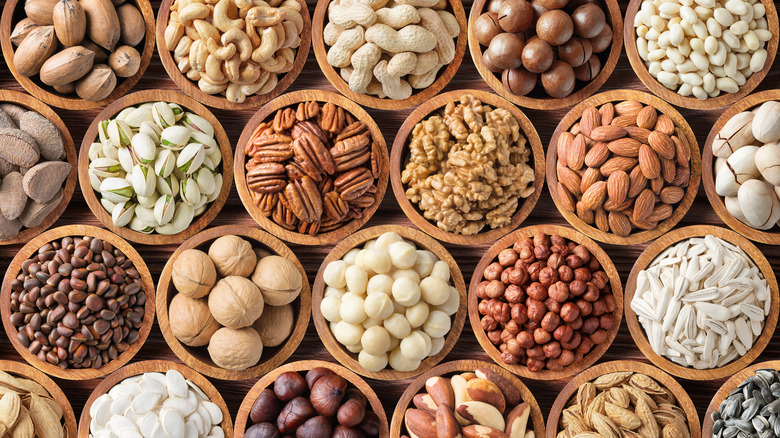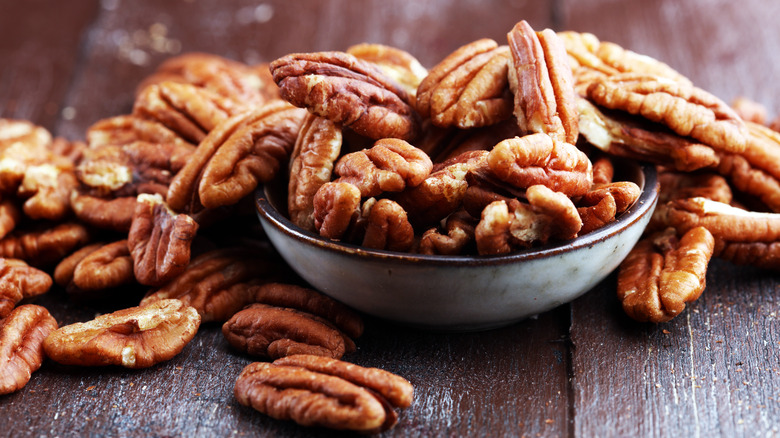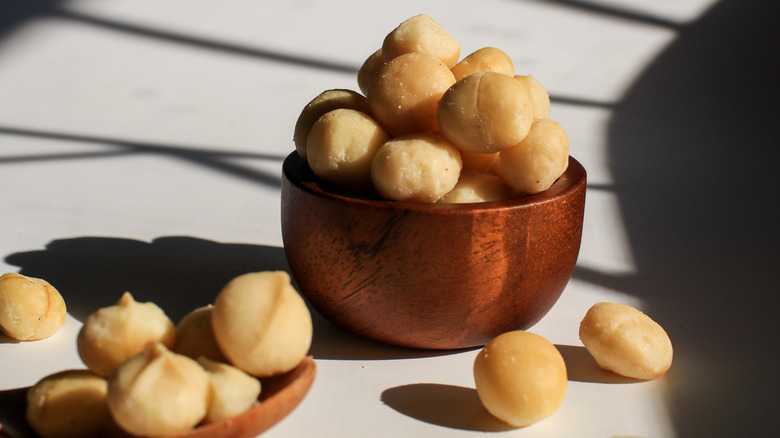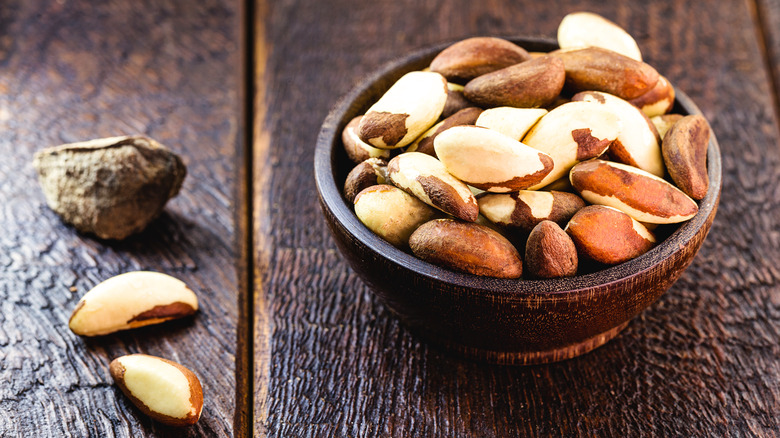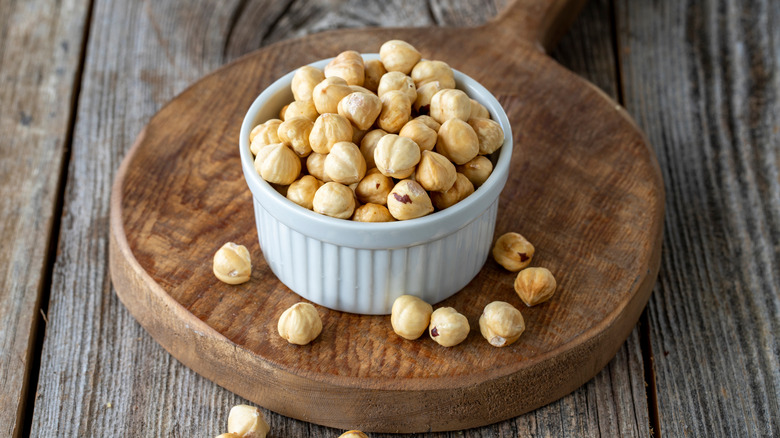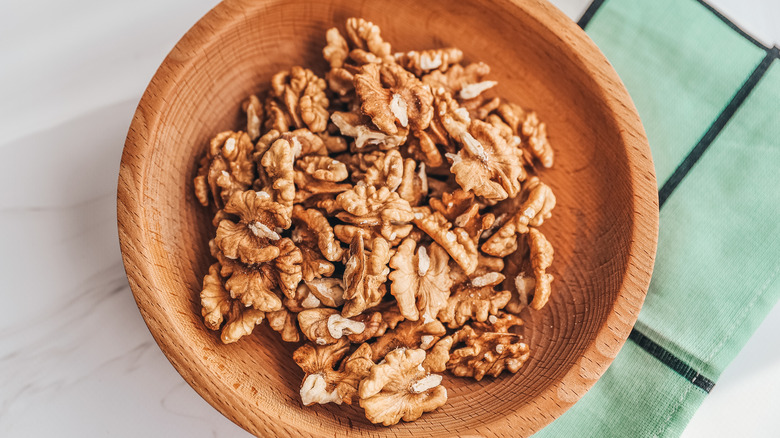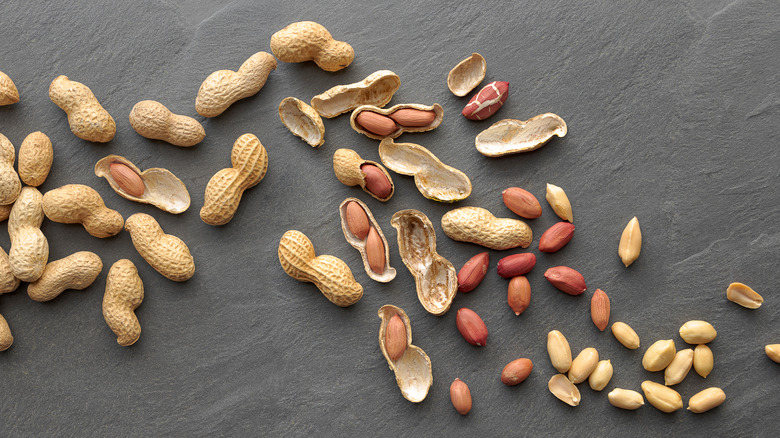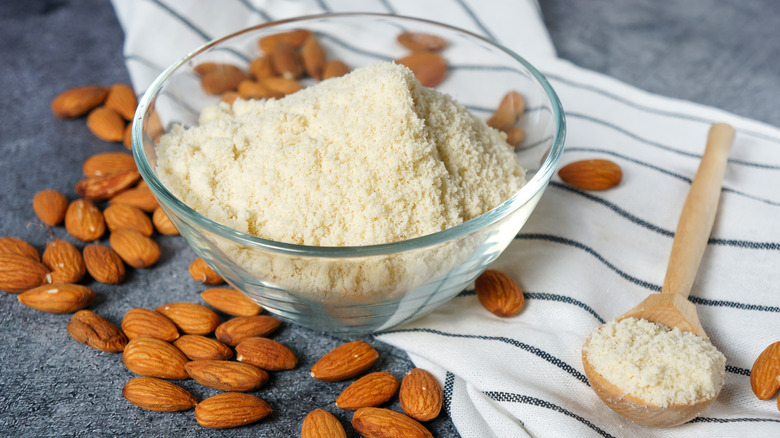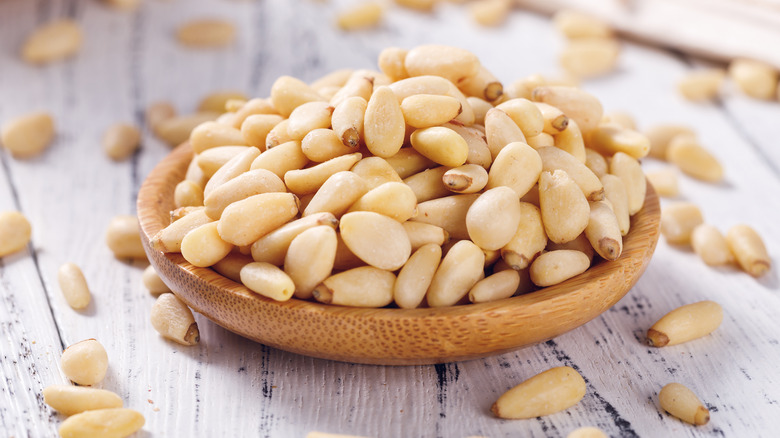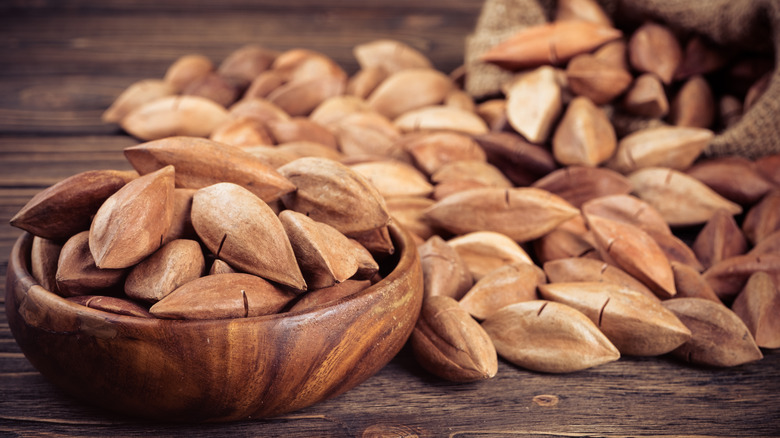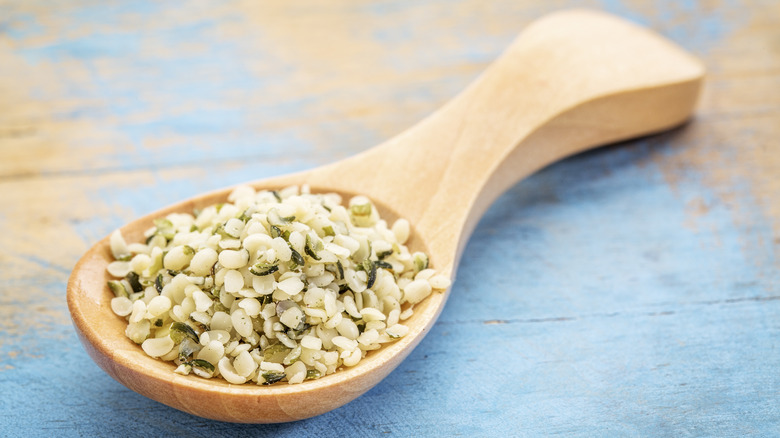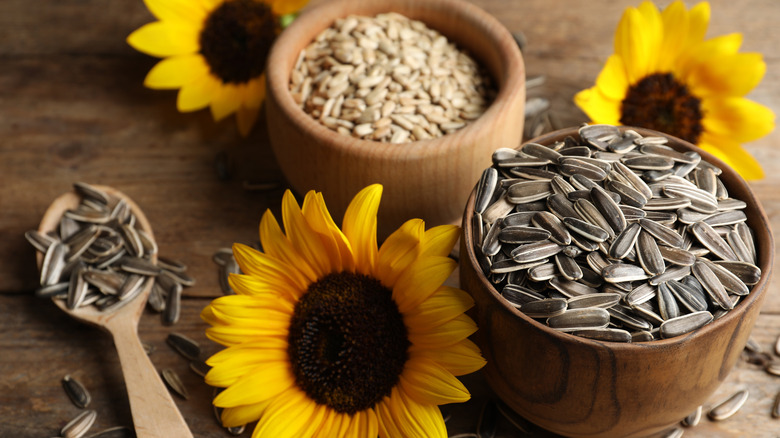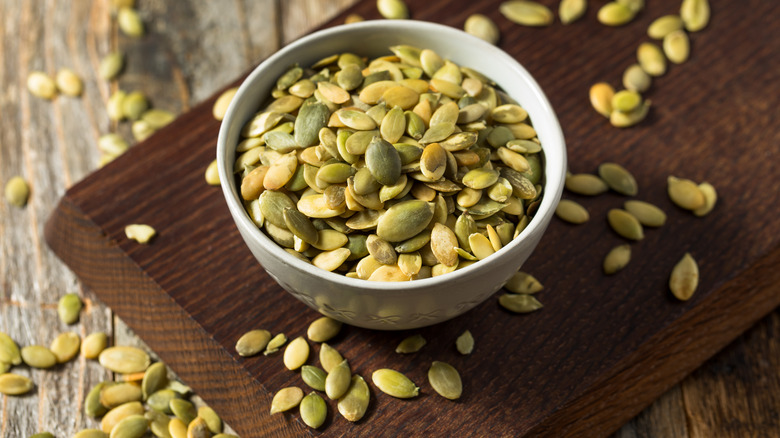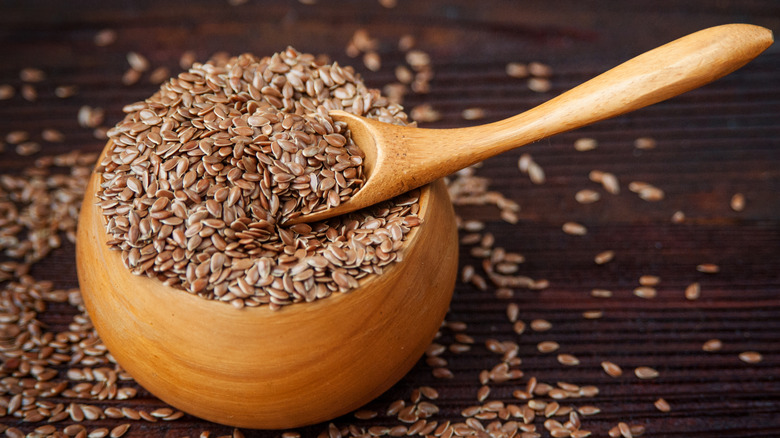13 Best Keto Nuts And Seeds You Should Try Next
The keto diet hasn't yet lost its allure, whether or not you're on board with a low-carb lifestyle. Thanks to this regimen, Harvard Health reports that many people successfully achieve weight loss goals. However, unless you have admirable levels of self-control, it can be hard to follow the restrictive guidelines of a keto diet. Finding the types of foods that will satiate you while staying on track is the first step to tackle. Depending on your specific diet, you're looking at capping your intake between 20 to 50 grams of carbohydrates per day. According to The Kitchn, these figures typically refer to net carbs — total carbs minus fiber.
Nuts and seeds are sometimes vilified for being high in fat, which is exactly what you want if you're sticking to a keto diet. Furthermore, as published in Nutrients in 2010, this category of foods is dense in nutrients, including fiber, protein, and minerals, making it a great way to add variety to your menu. Nonetheless, keep in mind that moderation is still recommended, as it is deceptively easy to overdo it with these bite-sized snacks. We've selected the top 13 nuts and seeds that are low in carbs and high in fat to start incorporating into your daily keto diet.
1. Pecans
You might have to fight your initial urge to skip the plain pecans and jump straight to the pie. However, pecans are so much more than an element in a pie filling and can be enjoyed in countless ways. Best of all, they are one of the nuts with the fewest grams of carbohydrates. According to Verywell Fit, a 1-ounce serving (around 19 halves) contains 4 grams, including 2.7 grams of fiber. This means that if you're focusing on net carbohydrate intake, you're looking at a mere 1.3 grams per serving.
The same portion size provides you with 20 grams of fat to build up to your daily total of around 165 grams for a 2,000-calorie diet, per Harvard Health. Thanks to the nut's nutritional profile, it consists of a balance of mono and polyunsaturated heart-healthy fats which help maintain steady blood sugar levels (via Verywell Fit). Not to mention, you'll get a generous helping of antioxidants, vitamins, and minerals.
Apart from the pecan's nutritional properties, the nut is incredibly tasty and versatile. It can work equally well in a sweet or savory preparation, though you'll want to steer clear of sugary recipes on a keto diet. Verywell Fit suggests crushing pecans to coat fish or chicken in lieu of standard breading. Crumble raw or roasted pecans over mashed cauliflower, add them as a garnish to leafy greens or vegetables, or simply snack on them solo (roasted in butter for the ultimate treat).
2. Macadamia nuts
Rich macadamia nuts are undoubtedly an excellent keto option. The round nut originates from Australia, though it was eventually brought to Hawaii, where its production continues to be successful, according to Verywell Fit. The outlet lists the carbohydrate content in a 1-ounce serving (10 to 12 nuts) at 3.8 grams, and with 2.3 grams of fiber, the net total is a low 1.5 grams.
At 21.6 grams of fat per ounce, macadamias are notably high in monounsaturated fats — even higher than olive oil, per Nambucca Macnuts. For anyone watching their dietary cholesterol intake, these decadent nuts contain none. With a couple of grams of protein (including all of the essential amino acids), various vitamins, and antioxidants, macadamias make a great addition to the keto diet.
You can generally purchase them pre-shelled, often roasted or fried and salted. The nut is also a common component in a number of sweets, be it chocolate bars or cookies. This is definitely a good add-in if you've been experimenting with keto desserts. Alternatively, the nut has been transformed into a variety of products, including milk, flour, nut butter, and oil (via Ketogenic). Use it for smoothies, baked goods, salad dressings, or crushed with your favorite herbs to make pesto. Not to mention, snacking on these creamy nuts is a feast in itself — dry roast them with your favorite spice mix for the ultimate flavor fat bomb.
3. Brazil nuts
Brazil nuts are a delicious treat that can be part of a balanced keto diet. While they might not be as easily accessible as more popular nuts, it's worth seeking them out. According to The Art of Keto, they are among the top nuts to include in a keto diet, thanks to their high fat and low carb content. Healthline indicates that a 1-ounce serving (about six nuts) contains 19 grams of fat, 3.3 grams of carbs, and 2.1 grams of fiber. With only 1.2 grams of net carbs, it's no wonder that Brazil nuts are a keto favorite.
It's best not to overdo it, though, since these large nuts contain significant quantities of selenium, a mineral that is necessary for body functioning but can be toxic at high levels (via Healthline). If you're planning to eat them on a daily basis, keep your portion size at three nuts to play it safe.
Brazil nuts are typically sold shelled, raw or roasted, and sometimes salted — ideal for an easy snack. Use them in homemade pesto, chop them up to sprinkle on a salad or vegetable dish, or add them to an assortment of mixed nuts for an added nutrition boost. Shape suggests grinding them to make energy balls or whipping up a vegan cheese with the creamy nuts. Meanwhile, nut butter is a great option if you want to enjoy them in a spreadable format.
4. Hazelnuts
Although your first introduction to hazelnuts may have been hidden behind a chocolatey Nutella disguise, these nuts come in plenty of other forms. A 1-ounce serving (around 21 hazelnuts) clocks in at 4.7 grams of carbs and 2.8 grams of fiber, for a net count of 1.9 grams (via Verywell Fit). You'll get a decent amount of fat, too, with 17 grams per portion, most of which are monounsaturated. With a protein content of around 4 grams, snacking on hazelnuts is a great way to tame your hunger.
Raw, roasted, shelled, or not, hazelnuts can be enjoyed alone as a snack, ground into butter (yes there is such a thing as a keto Nutella recipe), turned into flour or meal, and used as a garnish. If you're looking for an easy way to make some of your favorite baking recipes keto, adding hazelnut meal will simultaneously up the fat content, lower carbs, and add a delicious nutty flavor. However, you won't be able to use it as you would all-purpose flour, since it has neither starch nor gluten content, per Bob's Red Mill.
For best results, choose recipes that use hazelnut meal or substitute no more than a quarter of the flour. Once you start using these tasty nuts you'll want to incorporate them into sweet and savory dishes. Try adding hazelnut meal to smoothies, use it to bread fish or chicken, or add coarsely ground hazelnuts to pesto.
5. Walnuts
It's not hard to come by walnuts, although they might sometimes be sporting a hard shell. A notable quantity is being grown in California (per California Walnuts), which means they are readily available in the U.S. According to Healthline, a 1-ounce serving size (around 14 halves) contains 3.9 grams of carbohydrates, of which 1.9 are fiber. With 2 grams of net carbs and 18.5 grams of fat in a portion, you can see why walnuts are a great option for a keto diet.
Furthermore, the polyunsaturated fat content is beneficial to heart health and appears to have inflammation-reducing properties (via Healthline). A 2011 study published in Food & Function also notes that walnuts boast the highest antioxidant level of all nuts. With all these exceptional features, incorporating walnuts into your diet is a no-brainer. Whether you buy them whole, shelled, halved, or crumbled, walnuts add a delicious touch to both savory and sweet dishes.
Once shelled, the nuts can be enjoyed raw or roasted. Try sprinkling them over a salad, mixing them into granola, or eating them solo (toast them with spices for added flavor). You can also grind them into flour for baking, make nut butter, and add chopped halves to your favorite baked goods. Unsweetened walnut milk is a good dairy alternative, and walnut oil adds a pleasantly nutty touch to a simple spinach salad. And if you're looking to add more plant-based dishes to your menu, walnuts make a creative ground meat substitute.
6. Peanuts
Plenty of kids grew up eating peanuts in their spreadable format, but then again, most kids aren't following a keto diet. All the same, peanuts — which are technically a legume, not a nut — can fit into this low-carb high-fat regimen. According to Verywell Fit, a 1-ounce serving of raw unsalted peanuts (about 28) counts 4.6 grams of carbs and 2.4 grams of fiber. The net carb count is just over 2 grams per serving and the fat content sits at around 14 grams. With heart-healthy fats and the complete range of amino acids coming from 7 grams of protein, peanuts are undoubtedly nutritious.
Depending on the remaining elements in your keto menu, you may want to limit peanut intake, as they don't provide as much fat relative to, say, pecans or macadamias, and the carb content is slightly greater. However, as long as you are keeping track of the figures and monitoring your daily tally, there's no reason to avoid them.
The highly snackable nuts come raw, roasted, salted, fried, candied, and spiced, among the many options. You're best off skipping any versions with sweeteners — and that includes standard peanut butter. Check labels and stick to products with zero added sugars to ensure there are no hidden extras. Whether you munch on them as an easy snack, sprinkle chopped peanuts over a creamy coconut curry, or add peanut butter to smoothies or baked goods, this American favorite has a place in your keto diet.
7. Almonds
Almonds are one of the easiest nuts to find in the average American supermarket, which is great news, since they are so delicious. Nutritionally, a 1-ounce serving (24 almonds) clocks in at 6.1 grams of carbohydrates and 3.5 grams of fiber, for a net total of 2.6 grams of carbs (via Verywell Fit). The fat content is slightly lower than other nuts, and you'll only get 14.2 grams in a serving. Meanwhile, the protein comprises low quantities of all the essential amino acids, which makes almonds a good option for plant-based diets, too.
With a lower calorie count than most and a higher number of nuts per portion size, almonds provide a satisfying fix to cravings. Whether you enjoy them raw, roasted, or turned into milk, butter, flour, or meal, they are a great treat. When you're buying packaged almonds, be sure to double-check the ingredient labels, as extra sweeteners will derail your diet. Purchasing raw almonds and roasting them yourself is an easy way to obtain the results you want.
Add them to a nut and seed-based granola or trail mix for a healthy, crunchy snack. Almond butter is a nutritious alternative to peanut butter, and unsweetened almond milk fits into keto and dairy-free diets. Meanwhile, baked goods made with almond flour or meal have a pleasantly sweet and nutty flavor and a delightful consistency. Thanks to the nut's flavor profile, it works just as well in a dessert as it does sprinkled over a salad or sauteed vegetables.
8. Pine nuts
Pine nuts are a common ingredient in pesto, but they have plenty of other uses that are worth enjoying. They're not as low in carbs as other options on this list, and the hefty price tag might help curb your appetite. With 3.7 grams of carbs, including 1.1 grams of fiber and 1 gram of natural sugars, the net total comes to 2.6 grams per 1-ounce serving — or around 167 kernels (via Verywell Fit). You can eat a lot of tiny pine nuts before reaching that amount. A portion counts 4 grams of protein, making the nuts fairly nutritionally diverse.
You can eat pine nuts raw or toasted, though in the latter form they offer sweeter and nuttier flavors. It's not as common to find the nuts modified with sweeteners or additives, so you generally get what you see. To make homemade pesto you'll need a fairly large amount, so to keep your diet (and budget) on track, consider using pine nuts as a finishing garnish. They work well in both savory and sweet preparations; try sprinkling them over a pasta dish, salad, bowl of ice cream, yogurt, or even to top a simple cookie recipe (keto, of course).
9. Pili nuts
This might be the first time you hear about pili nuts, but if you stick to a keto diet then it won't be the last. The nuts are found inside a small fruit (also edible) that looks strangely similar to an avocado (via Shape). South China Morning Post reports that these nuts are primarily grown in the Philippines, going so far as to label them a superfood for their nutritional properties.
Verywell Fit follows up the claims, noting that pilis contain more fat than any other nut at 24 grams in a 1-ounce serving, most of which is monounsaturated. With 1 gram of carbohydrates all coming from fiber, these nuts are a keto dieter's dream. Furthermore, they contain all of the essential amino acids and are a great source of plant-based protein.
The buttery flavor is reminiscent of pumpkin and sunflower seeds, and pilis usually come roasted, unsalted, sprouted, or as butter (via Verywell Fit). They are currently not largely available on the market, but if you are looking to purchase them, then Pili Hunters is your go-to source. The company sells packaged nuts with light seasonings, aka the perfect snack to satiate your cravings. For a different take, Lavva makes vegan yogurt from the creamy nuts.
10. Hemp hearts
While hemp hearts come from a plant in the cannabis family, the association with marijuana ends there (via Livestrong). Consuming the shelled seeds will have no unexpected effects, and in fact, you'll only benefit from their excellent nutritional properties. Verywell Fit indicates that a 3 tablespoon portion contains 2.6 grams of carbs and 1.2 grams of fiber, totaling a net count of 1.4 grams.
The same amount will load your daily tally up with 15 grams of fat, primarily polyunsaturated. The protein count is notably high at around 10 grams, and it contains all of the essential amino acids. Consequently, you'll want to be sure to monitor the rest of your protein intake to ensure that you are within the parameters of your keto regimen. Nonetheless, anyone following a vegan diet will hugely benefit from the protein content, which Verywell Fit adds is easily digestible.
You'll notice that the tiny seeds aren't really meant for snacking on. Instead, try adding a few spoonfuls to smoothies, make your own seed milk, add them to granola or baked goods, grind them into flour, or even use them as a makeshift protein powder (via Verywell Fit). The mildly nutty taste won't overpower other flavors, so it's a quick way to get a healthy fat boost minus the carbs.
11. Sunflower seeds
Shelled sunflower seeds are the easiest format to use. They come roasted, raw, salted, or not. Each quarter cup serving contains 7 grams of carbohydrates with 3.9 grams of fiber, per Verywell Fit. The net carb count sits just above 3 grams, so you'll want to avoid overdoing it with the tiny seeds. All the same, with close to 20 grams of fat and 5.8 grams of protein, you'll be filling up on your other macros too. With mono and polyunsaturated fats, sunflower seeds are a heart-healthy option that can easily fit into a keto diet.
Thanks to their nutritional profile, the seeds are a great way to satiate hunger while obtaining numerous vitamins and minerals (in particular vitamin E), Verywell Fit notes. Toasted, the seeds have a nuttier flavor, which makes them well suited for savory dishes. Try adding them to a salad, vegetable dish, or bread recipe. The raw seeds are easy to grind into butter, or they can add bulk to granola, energy balls, and other baked goods. For a more cost-friendly option for homemade pesto, swap pine nuts with sunflower seeds. And of course, enjoy the small seeds in trail mix or salted and solo. To slow down your pace as you munch, purchase them in the shell.
12. Pumpkin seeds
Pumpkin seeds make a nutritious snack that fits into the framework of most keto diets, as long as you prioritize moderation. You'll find the seeds both shelled and whole; Choosing Nutrition highlights that the former, aka pepitas, will have about half the carb content. Healthline lists the carb count at 5 grams per 1-ounce portion of shelled seeds, with 1.7 grams from fiber. The fat content is lower than other options in our selection, with 13 grams per ounce.
In fact, pumpkin seeds contain a fair bit of protein, with 7 grams in a serving, which makes them a suitable choice to up your protein count but less so for increasing your fat intake. Apart from the macro content, these small seeds boast an assortment of vitamins, minerals, and antioxidants that are required for healthy functioning (via Healthline).
Due to their nutritional profile, you're best off using pumpkin seeds as a light garnish or component in a dish as opposed to freely snacking away. Keto Fresh recommends using them in salads, sprinkled over soups or smoothies, or added to granola or trail mix. Alternatively, add them to baked goods for a satisfying crunch, or grind them into seed butter or a meal to use for pesto or desserts. For optimal nutrition, stick to plain pumpkin seeds and season them yourself if desired.
13. Flax seeds
Flax seeds are an easy, low-carb way to add some fat into your diet, especially if you're looking for alternatives to grain products. According to Verywell Fit, 1 tablespoon contains 3 grams of carbs and 2.8 grams of fiber, leaving a mere 0.2 grams of net carbs to digest. With 4.3 grams of fat per tablespoon, you won't be upping your tally by much, but a sprinkle here and there can make a difference. Plus, if you grind them into flour or meal, then you'll be using a larger amount, thereby increasing the total fat count.
Flax seeds are best used in a milled format, since this greatly increases their digestibility. For maximum freshness, grind them yourself prior to use and keep them stored in the refrigerator to avoid rancid flavors (via Clean Green Simple). Mixed with water, the ground seeds produce a gel-like substance that makes a great substitute for eggs in vegan recipes (via Healthline). Similarly, think about incorporating them into meat and veggie burgers, smoothies, yogurt, and baked goods for added nutrition value. The light, nutty flavor complements both sweet and savory recipes, making flax seeds an easy option to use in the kitchen.
